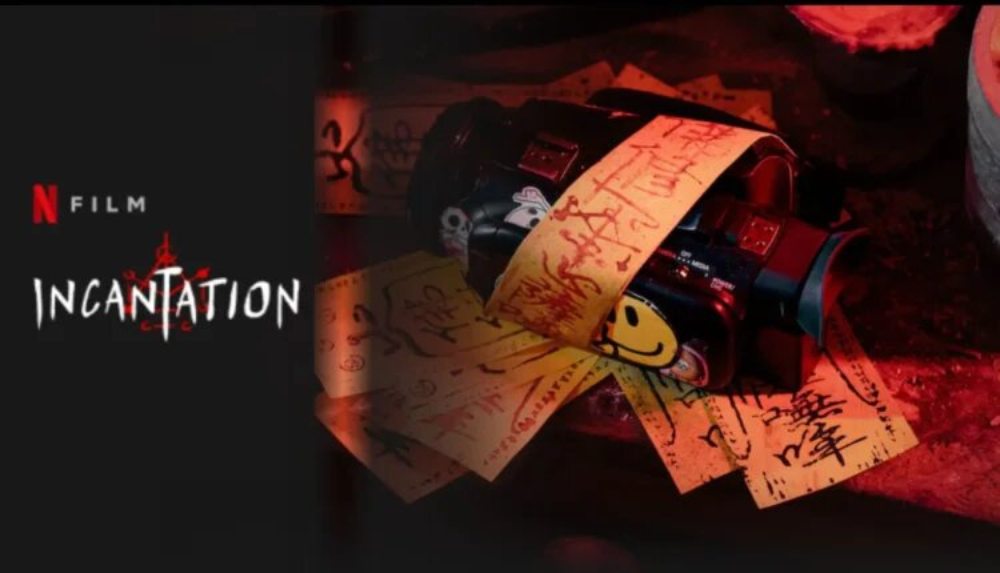Table of Contents
ToggleIntroduction:
In the realm of horror cinema, where spine-tingling narratives and chilling tales reign supreme, “Incantation” emerges as a formidable force, captivating audiences with its otherworldly storyline and supernatural allure. This Netflix original film, directed by the visionary filmmaker Yuan Ming, weaves a spellbinding tale that transcends the boundaries of conventional horror, delving deep into the intricacies of ancient curses, familial bonds, and the enigmatic intersection of the spiritual and earthly realms.
The Plot:
“Incantation” unfolds in a remote village in Taiwan, where an ancient curse, rooted in mysticism and folklore, haunts the lives of its unsuspecting inhabitants. At its core, the film revolves around the intertwined fates of a mother-daughter duo, Dodo and Ronan, who find themselves entangled in a web of supernatural occurrences triggered by an age-old incantation.
The narrative kicks off when Ronan stumbles upon a mysterious tunnel near her home, leading her to unearth a long-buried family secret. As she delves deeper into the history of her ancestors, she discovers a curse that has spanned generations, threatening to consume her own existence. Ming’s masterful storytelling and atmospheric direction create a palpable sense of dread, keeping the audience on the edge of their seats.
The Cinematic Experience Incantation:
“Incantation” distinguishes itself with its unique blend of horror elements and cultural richness. Ming skillfully integrates elements of Taiwanese and Chinese folklore, infusing the film with an authentic sense of time and place. The village, with its ancient rituals and traditions, becomes a character in itself, adding layers of complexity to the narrative.
The film’s use of actual footage from the village, seamlessly intertwined with the fictional storyline, blurs the lines between reality and the supernatural. Viewers are taken on a visually stunning journey through the narrow, winding streets of the village, creating an immersive experience that heightens the overall sense of unease.
The Intersection of Buddhism and the Supernatural:
“Incantation” takes a unique approach by incorporating elements of Buddhism into its horror narrative. The village is portrayed as a place where ancient deities and spiritual forces coexist with the mundane aspects of daily life. The presence of Buddha statues and rituals adds a thought-provoking layer to the story, exploring the thin line between the spiritual and the corporeal.
Yuan Ming skillfully navigates the complexities of Buddhist philosophy, using it as a backdrop to explore themes of karma, reincarnation, and the cyclical nature of existence. The film prompts viewers to reflect on the interplay between the spiritual and material worlds, challenging preconceived notions about the supernatural.

Family Ties and Generational Curses:
At its core, “Incantation” is a haunting exploration of family ties and the impact of generational curses. Ronan’s journey becomes a metaphorical unraveling of the sins of the past, as she confronts the choices made by her ancestors. The film raises poignant questions about the inevitability of destiny and the role individuals play in breaking free from the shackles of ancestral burdens.
The Mother-Daughter Dynamic:
The relationship between Dodo and Ronan serves as the emotional anchor of “Incantation.” Ming crafts a nuanced portrayal of the mother-daughter dynamic, using it as a vehicle to explore themes of sacrifice, love, and the lengths one would go to protect their family. The palpable chemistry between the two characters adds a human touch to the supernatural narrative, allowing viewers to connect with the emotional core of the story.
The Unraveling of Time:
“Incantation” employs a non-linear narrative structure, deftly jumping between different time periods to unveil the layers of the curse. Ming’s manipulation of time adds a sense of urgency and unpredictability to the film, keeping the audience guessing about the ultimate resolution. The use of flashbacks and flash-forwards enhances the suspense, making the unfolding of the story a truly immersive experience.
The Enigmatic Ending:
As the film hurtles towards its climax, viewers are treated to a revelation that reshapes their understanding of the curse and its origins. Ming skillfully ties together the threads of the narrative, providing a satisfying resolution that leaves room for interpretation. The enigmatic ending lingers in the minds of the audience, inviting them to reflect on the cyclical nature of life and the eternal dance between the earthly and the supernatural.
Impact on Audiences:
“Incantation” has left an indelible mark on horror cinema, captivating audiences worldwide with its rich storytelling and atmospheric cinematography. The film’s unique blend of cultural elements, supernatural horror, and familial drama has garnered a dedicated fan base, sparking discussions and theories about its deeper meanings.
The use of social media platforms has allowed fans to share their interpretations and theories, creating a community of viewers eager to dissect the intricacies of the film. The mysterious tunnel, the ancient incantation, and the village’s enigmatic deity have become iconic symbols, inspiring fan art, memes, and even real-life explorations of the film’s locations.
In Conclusion:
“Incantation” stands as a testament to the power of storytelling in cinema, transcending the boundaries of conventional horror to explore the depths of ancient curses, familial bonds, and the interplay between the spiritual and earthly realms. Yuan Ming’s visionary direction, coupled with a stellar cast and a compelling narrative, has firmly established the film as a milestone in the horror genre.
As viewers continue to unravel the mysteries of “Incantation,” the film’s legacy endures, leaving an indelible mark on the collective psyche of those brave enough to venture into the supernatural depths of this cinematic masterpiece. Whether dissecting the intricacies of the curse or pondering the cyclical nature of life, audiences will undoubtedly find themselves enchanted by the lingering echoes of “Incantation” long after the credits roll.























+ There are no comments
Add yours